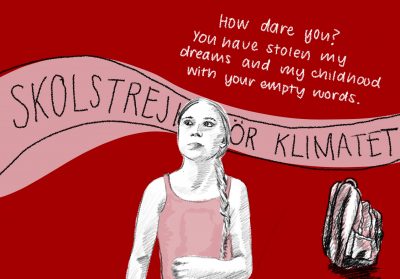A recent 2021 survey of 2,000 British parents found that two-thirds of parents want their children to follow in climate change activist Greta Thunberg’s footsteps and become “eco-warriors.”
On Aug. 20, 2018, 16-year-old Thunberg created a moment of historical notability when she skipped school to sit outside of the Swedish Parliament with a sign that read “Skolstrejk för Klimatet,” which translated to English reads “School Strike for Climate.”

Thunberg sat in protest for the full length of the school day, from 8:30 a.m. to 3 p.m.. Thunberg was sending a message: the climate crisis is such a dire emergency that she must sacrifice her education to face it.
What is education good for if the world is in flames? From that day on, Thunberg continued to skip school to protest government inaction, but she was never alone again. People saw her on Twitter and joined the movement.
Today, she runs a student-led organization called Fridays for Future. The premise of this organization lies in sacrifice in exchange for activist progress — sacrifice to send a message. Thunberg and thousands of other students will “skip school” on Fridays to protest climate change.
Is Thunberg’s life aspirational? Should we follow in her footsteps?
Sacrifice in activism is not a unique idea. Gandhi starved himself to protest the oppression of India’s poorest classes. Black people living in Montgomery walked up to eight miles to work and back instead of taking the bus to protest segregation in the 1950s. In 2020, WNBA star Maya Moore put her career on hold to protest the imprisonment of an innocent man. It is not a unique idea — but is it the right one? What does it say about human society that we need to sacrifice our necessities to get others to listen?
Sacrifice in activism plays on the heartstrings of humanity. It begs others to feel empathy and change their ways accordingly. Yet, sacrifice in activism means people looking to create positive change must suffer to do so. It does not sit right with me that this is the way change is achieved in our society. When I look at Thunberg’s progress as a climate change activist, I admire her — and I hurt for her. I suppose that is the point.
The key to Thunberg’s climate change activism is not that she sacrificed her education to send a message, but rather that she felt like she had no other choice, and she was incredibly angry about it. In her 2019 address to the United Nations, she accused the audience:
“How dare you? You have stolen my dreams and my childhood with your empty words.”
In this address, Thunberg implied that she had no other choice but to participate in activism, thus sacrificing her “dreams and childhood.” The “empty words” here speak to the empty promises of the United Nations to address climate change.
She communicates that it is the fault of world leaders and previous generations that climate change is an unstoppable force. She voices frustration that she is even at the UN at all, addressing them about climate change, and emphasizes the fact that she “shouldn’t be here.”
Thunberg’s sacrifice is inspiring in its bravery but tragic in its necessity. The tragedy here lies at the moment in which a child found it necessary to put aside her education to fight against climate change.
No child should have to bear such a weight. Instead of simply applauding Thunberg, we should be analyzing the conditions that have shaped her activism.





The panic in a younger generation about the environment, in part, is due to what they have NOT been taught about the “nature” of of things.
People of faith in a number of religions actually have something in common w/ scientists, & their views are not mutually exclusive: They believe there was a beginning to the universe and that there will be an end. Entropy is built-in as is the Law of Conservation of Matter. Fluctuations in nature can be viewed as transformation of matter vs. total eradication. Spring hints at resurrection, a dying to be born. Everything is made of molecules in motion, too, & the “security” we think we have secured can change in a flash. Earthquakes, famine, wars, pestilence, plagues, storms have ALWAYS “been there” as has been a reshuffling of land masses, valleys, mountains, etc. The younger generation have largely been reared with a secular mindset & a Selfie and Instagram narcissism concerned more about “materiality”/SELF than things spiritual. This vacuum has led them, frankly, to become prey to a man-centered, self-help utopian world view that will not deliver, in the end, anymore than Stalin did. (They don’t know that history either about Lenin’s “food” policies that were implemented by Stalin.). Some of their panic is due to parental focus, too, on “stuff” and the accoutrements and language of success vs. eternal verities. How many children have been taught to see death as a normal part of life?
(I went to funerals growing up that more so than not were celebrations of lives well-lived & were of people who knew “the current order of things” was/is transitory. They knew the truth of Job 38.)
Can humans ever do more than provide some stopgaps until the end? It will come regardless of treaties and legislation.
Religions Created Over Population. Should have listened to scientists. Now Over Population will bring famine, war, pestilence and mass extinction. Jesus tastes bitter!!!
She is great
Great Greta